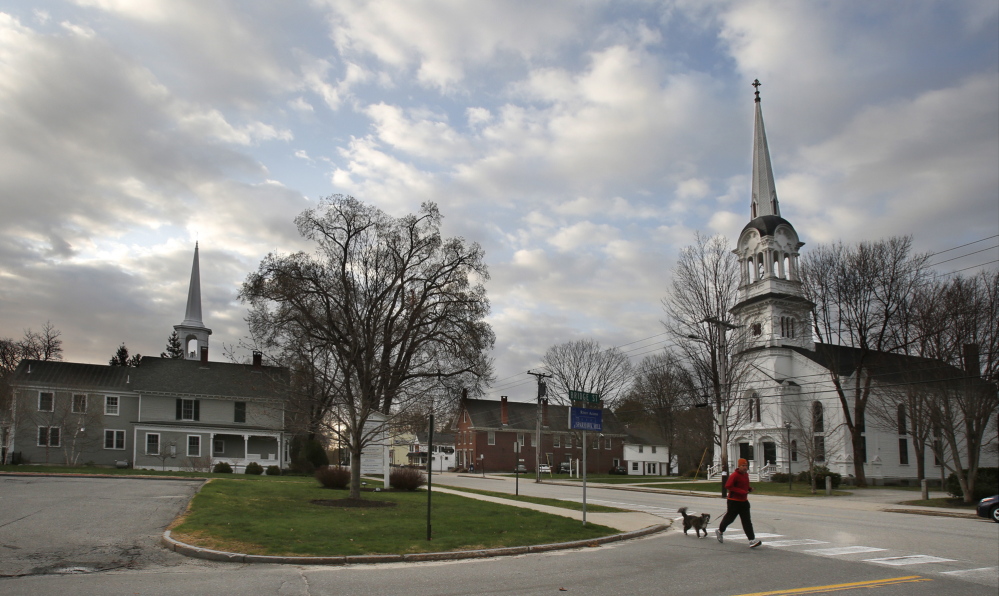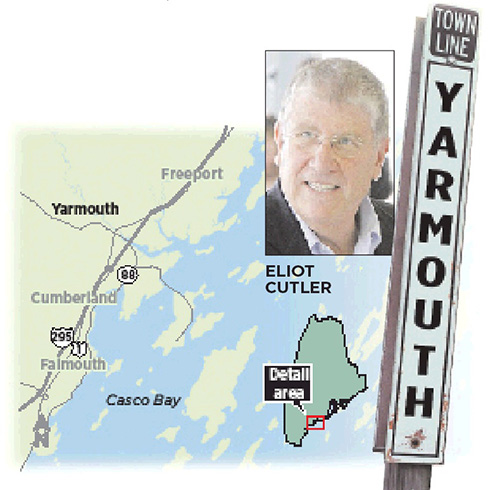YARMOUTH –– Eliot Cutler surveyed the crowd of about 100 people packed into the newly built Yarmouth History Center, across from Royal River Park.
They had come on a Sunday afternoon to hear Cutler, independent candidate for governor, talk about why he is the best candidate to lead Maine, and also why he is going to need money to compete with his party-backed opponents, Republican Gov. Paul LePage and Democrat Mike Michaud.
“I need your rear bumpers, your front lawns. I need your hearts and your voices,” he said. “And I need your wallets.”
The faces staring back at Cutler looked a lot like him: Well educated. Affluent. Slightly older. Politically moderate.
These are Cutler’s people and his best chance of success in November.
Aside from Cape Elizabeth, where Cutler and his wife have lived for 15 years, no community gave the independent a higher percentage of its votes during his near-miss loss to LePage in 2010 than the town of Yarmouth. Of the 4,534 residents who voted, 53 percent checked Cutler’s name, compared to 29 percent for LePage and 14 percent for Democrat Libby Mitchell.
Tucked between Cumberland and Freeport on the Route 1 and Interstate 295 corridors, Yarmouth is known for its quaint village feel, its well-regarded schools, its high property taxes and home values and an annual clam festival that draws up to 100,000 summer visitors.
People in Yarmouth are more educated as a whole than the rest of the state (57 percent of adults have a bachelor’s degree or higher compared to 27 percent statewide) and they make more money (42 percent of households make more than $100,000, compared to 16 percent statewide). The town’s unemployment and poverty rates are much lower than most other Maine communities as well.
People choose to live in Yarmouth for the obvious reason – that it’s close to Portland, Maine’s commerce hub – but many residents also say they picked the town because it has its own identity, one that is family-friendly, civically engaged and has a high quality of life.
Mark Brewer, a political scientist at the University of Maine, said he’s not surprised that Cutler has strong support in Yarmouth.
“He’s doing all the right things – campaigning hard, putting forth substantive policy proposals and calling for debates – but there is only so much he can do,” he said.
Brewer said Cutler will need to keep convincing voters in Yarmouth – and elsewhere – that he can win a three-way race and not just play the role of spoiler.
“I know his people disagree, but this race will be decided by what the people who don’t like LePage do,” he said. “Voters may have a preference, but I think the real preference is no second term for Paul LePage.”
INDEPENDENCE A STRONG SUIT
Four years ago, Cutler scored well in the suburbs north of Portland. He captured 47 percent of the vote in Cumberland, 49 percent in Freeport and 45 percent in Falmouth – numbers close to his results in Yarmouth.
Deb Nelson, 54, who moved to Yarmouth about 20 years ago from Massachusetts when her husband got a job nearby, was among those who backed Cutler.
“He was not at the political edges like the other two candidates,” Nelson said over coffee at the Royal Bean on Main Street. “I liked that. He seems like he’s smart enough to talk to all sides, not just the people that support him.”
Dick Woodbury, an economist, outgoing state senator, Cutler supporter and a Yarmouth resident since 1997, said he sees the town as more than just a bedroom community. He also has noticed an independent streak during his three terms in the Senate and three more terms in the Maine House.
“They keep electing me,” said Woodbury, who is one of just five current lawmakers among 186 total who are not aligned with one of the major political parties.
Still, Yarmouth’s 2010 surge for Cutler did not quite match the electorate. Yarmouth’s political makeup for that election was remarkably even: 34 percent Democrat, 32 percent Republican and 31 percent unenrolled.
Part of the reason for Cutler’s strong support in 2010 may have been defensive.
According to dozens of residents interviewed over the last few weeks, many voted for Cutler in 2010 not only because they thought he would make a good governor, but also because they were concerned about seeing LePage in the Blaine House.
That same concern exists this time around.
Tom Cox, 70, voted for Cutler four years ago but said he won’t do it again.
“He gave us LePage,” Cox said while drinking coffee at Clayton’s, a popular spot on Route 1.
Cox said he probably will vote for Michaud in November. He said he thinks the Democrat would be a “mediocre” governor but “probably won’t do much damage.”
“If I thought (Cutler) could win, I’d vote for him in a heartbeat,” he said.
THE PRICE OF TOP SCHOOLS
Nearly everyone in Yarmouth – even those like Deb Nelson who don’t have children in school – say the education system is the town’s crowning achievement.
Last month, U.S. News & World Report released its annual list of top high schools in Maine. Yarmouth was third, behind Falmouth and the Maine School of Science and Mathematics in Limestone. The town also is home to North Yarmouth Academy, one of the top private high schools in the state.
Elizabeth Pratt, 44, moved from Watertown, Massachusetts, last month with her husband, who got a job in Brunswick, and their two school-age children. They picked Yarmouth, she said, because of the schools.
Tim and Karla Coury, both 43, have lived in Yarmouth for the past 14 years. Before that, they lived in Tucson, Arizona.
Jobs brought them to Maine but the schools and the quaint charm brought them to Yarmouth.
“I was walking down Main Street and I was pregnant and I was picturing myself pushing a stroller,” Karla Coury said. “That was it.”
They now have three children in local schools and are happy here.
But those good schools cost money.
“It’s an expensive community, but the value is there,” Tim Coury said. “We feel like we’re around a lot of like-minded people.”
Twenty years ago, the town relied heavily on the former Central Maine Power Co. plant at Wyman Station on Cousins Island to generate tax revenue. It accounted for about 40 percent of the tax base. Today, the power station is largely dormant and represents just 7 percent of the tax base.
Nat Tupper, Yarmouth’s town manager, said 72 percent of the town’s tax revenue today comes from residential taxpayers. Its tax rate, at $22 per $1,000 of valuation, is among the highest around. The average home value is about $283,000, which puts the average annual tax bill at about $6,200.
Cutler’s recent tax reform proposal, which would lower property taxes for most homeowners by increasing the homestead exemption, has appeal with Yarmouth residents who have been dealing with steadily rising taxes. His tax plan also would add an extra $100 million in revenue sharing to towns, the bulk of which ends up offsetting school spending in communities like Yarmouth where education dominates the local budget.
Brewer, the UMaine political scientist, said Cutler has done better so far at putting forward substantive policy initiatives. LePage and Michaud, he said, have been less specific.
Still, Yarmouth residents seem to most share a strong anti-LePage sentiment and a reluctance to embrace Michaud fully. Part of that might be name recognition. Michaud has represented Maine’s 2nd Congressional District for 12 years but he’s lesser known in Greater Portland.
Cutler, meanwhile, is best known in southern Maine, although that doesn’t necessarily mean he’ll carry Yarmouth as strongly this time.
Pratt, a newcomer to Maine, is keenly aware of the political landscape.
“I just know I want to vote out LePage,” she said. “But I’m eager to learn about the other two candidates.”
Both Courys said they likely will not vote for LePage, but they rejected the idea of strategic voting. They said they will pay attention to the candidates and choose the one they feel best represents their values.
Right now, they are not sure who that is.
A POOR POLITICAL BAROMETER?
Ironically, the things that Yarmouth and Cutler have in common are things that don’t necessarily play well in other parts of the state, particularly rural, economically distressed areas.
Educated and affluent can translate to elitist and out of touch in far-flung, rural areas of Maine.
Marc Mueller, 65, runs a small business that produces plant extracts used in cosmetics. He’s been in Yarmouth since 1993. As with others, he was drawn to the town by its schools. His four children all went through the Yarmouth system. One was a valedictorian.
Mueller said he still likes Yarmouth but predicts that it will “look like Greenwich, Connecticut, in 50 years.”
Greenwich, which is less than 30 miles north of Manhattan, is among the most sought-after places to live in the country and also one of the most expensive.
“I think most of the working class people are getting priced out of (Yarmouth),” he said.
Mueller said he became a Republican, like many others, when Ronald Reagan ascended to the White House. He voted for LePage in 2010 because he liked his fiscal conservatism and said he likely will do so again.
But he also said he’s tired of the two-party system, so Cutler has some appeal.
Olis Cook, 70, is on her second tour of Yarmouth. She lived in town many years ago, then moved out to rural Otisfield before returning. She said the town is a lot different now from what it was in the 1970s.
“It’s a lot more affluent,” Cook said. “And I’m not sure that’s all good. There are a lot more trappings, more non-essentials.”
Cook said she voted for Cutler four years ago and generally likes the idea of a strong independent to cut through the partisanship that has infested politics in recent years.
She’s undecided this time around and hasn’t ruled out any of the candidates.
“I just want honesty,” she said. “Don’t promise me the moon.”
Asked where Cutler supporters might turn if they don’t end up voting for him, Brewer, the political scientist, said: “My guess is more would go to Michaud, but I’m not terribly confident in that prediction.”
During the community event at the Yarmouth History Center, Cutler talked about political moderation. He paraphrased from a novel by Massachusetts author Dennis Lehane in which a character talks about looking for more moderate candidates. Another character challenges the notion that there is an appetite for moderates, because “they think too much,” Cutler said, eliciting laughter from the crowd.
That seems to fit Yarmouth, a town filled with mostly thoughtful, engaged people who often eschew extreme party positions.
Bill Harwood, one of several hosts of the event, said Cutler has been working harder than his opponents. He said Cutler deserves their support because he has good policies and a positive vision for Maine.
“He gets us,” Harwood said.
Eric Russell can be contacted at 791-6344 or:
erussell@pressherald.com
Twitter: @PPHEricRussell
Send questions/comments to the editors.



